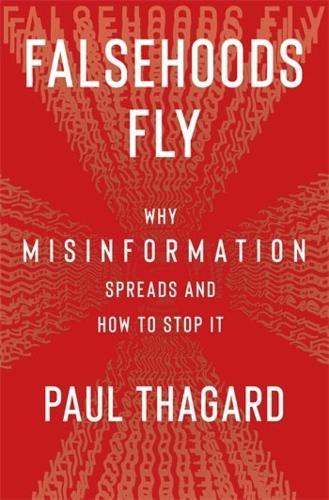Overview
Misinformation is one of the twenty-first century's greatest challenges, a peril to democracy, peace, science, and public health. Yet we lack a clear understanding of what makes misinformation so potent and why it can spread so rapidly. In Falsehoods Fly, a leading cognitive scientist and philosopher offers a new framework for recognizing and countering misleading claims by exploring the ways that information works-and breaks down. Paul Thagard examines the dangers of misinformation on COVID-19, climate change, conspiracy theories, inequality, and the Russian invasion of Ukraine. He argues that effective responses to these problems require understanding how information is generated and spread. Bringing together empirical findings about the psychological and social mechanisms that drive cognitive errors with philosophical accounts of critical thinking, Thagard develops an innovative theory of how we gain information. Grasping how the generation and transmission of knowledge can fail helps us find ways to repair it and provides tools for converting misinformation into facts. Offering a deep and rich account of the nature and workings of information, Falsehoods Fly provides practical, concrete strategies to stop the creation and spread of misinformation.
Full Product Details
Author: Paul Thagard
Publisher: Columbia University Press
Imprint: Columbia University Press
ISBN: 9780231213950
ISBN 10: 0231213956
Pages: 376
Publication Date: 20 February 2024
Audience:
General/trade
,
General
Format: Paperback
Publisher's Status: Active
Availability: Available To Order

We have confirmation that this item is in stock with the supplier. It will be ordered in for you and dispatched immediately.
Reviews
Paul Thagard has done a great public service by writing such an accessible, comprehensive book on what many feel is the great scourge of our age: misinformation. I am delighted to see a philosopher of such stature take on this problem, bringing logic, crystal-clear prose, and a little hope to a topic that impacts us all. This is public philosophy at its finest. -- Lee McIntyre, author of <i>On Disinformation: How to Fight for Truth and Protect Democracy</i> Falsehoods Fly gives a novel framework for thinking about the various human mechanisms involved the spread of misinformation. By breaking this process down into concrete stages, Thagard helps identify the particular aspects of humans that make them susceptible to false beliefs. He draws on the latest in cognitive science to identify where the processes of misinformation can best be interrupted and stopped. A bestiary of current examples, from the COVID-19 pandemic to the Russia-Ukraine war help situate his arguments. This insightful book can help us all better understand ourselves, and improve our ability to form good beliefs. -- Cailin O'Connor, coauthor of <i>The Misinformation Age: How False Beliefs Spread</i>
"In this important book, renowned philosopher Paul Thagard doesn’t beat around the bush: misinformation kills. But what is misinformation exactly? Thagard offers not only a bold new theory but also actionable solutions. A timely and compelling read. -- Sander van der Linden, author of <i>Foolproof: Why Misinformation Infects Our Minds and How to Build Immunity</i> Paul Thagard has done a great public service by writing such an accessible, comprehensive book on what many feel is the great scourge of our age: misinformation. I am delighted to see a philosopher of such stature take on this problem, bringing logic, crystal-clear prose, and a little hope to a topic that affects us all. This is public philosophy at its finest. -- Lee McIntyre, author of <i>On Disinformation: How to Fight for Truth and Protect Democracy</i> Falsehoods Fly gives a novel framework for thinking about the various mechanisms involved in the spread of misinformation. By breaking this process down into concrete stages, Thagard helps identify what makes people susceptible to false beliefs. He draws on the latest in cognitive science to identify where the processes of misinformation can best be interrupted and stopped. A range of current examples, from the COVID-19 pandemic to the Russia-Ukraine war, helps situate his arguments. This insightful book can help us all better understand ourselves and improve our ability to form good beliefs. -- Cailin O'Connor, coauthor of <i>The Misinformation Age: How False Beliefs Spread</i> In his signature lucid and witty style, Paul Thagard offers a novel theory of misinformation—how it is generated and spread and how it can be fixed. His theory is rooted in a solid foundation and comes with a healthy dose of optimism that bullshitters and their ""alternative facts"" will not prevail. A refreshing perspective and satisfying read. -- Olaf Dammann, Tufts University School of Medicine"
Paul Thagard has done a great public service by writing such an accessible, comprehensive book on what many feel is the great scourge of our age: misinformation. I am delighted to see a philosopher of such stature take on this problem, bringing logic, crystal-clear prose, and a little hope to a topic that impacts us all. This is public philosophy at its finest. -- Lee McIntyre, author of <i>On Disinformation: How to Fight for Truth and Protect Democracy</i>
Author Information
Paul Thagard is distinguished professor emeritus of philosophy at the University of Waterloo and fellow of the Royal Society of Canada, the Cognitive Science Society, and the Association for Psychological Science. His books include Bots and Beasts: What Makes Machines, Animals, and People Smart? (2021) and Balance: How It Works and What It Means (Columbia, 2022).




